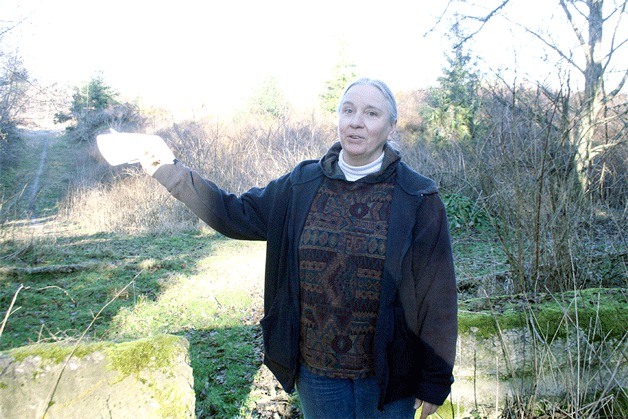The owners of a Central Whidbey gravel mine with a history of violating environmental rules want to expand sand and gravel surface operations by 100 acres to excavate about 10 million tons of the road-building material.
The Island County hearing examiner will hold a public hearing on the proposal by Rempel Brothers Concrete, Inc., at 10 a.m., Thursday, Jan. 6 at the commissioners’ hearing room in Coupeville.
At least one member of the Ellwood Road neighborhood next to the gravel pit, located north of the Greenbank Farm, will be at the meeting to speak against the proposal. Debbie Vrungos said she doesn’t trust the company to follow rules designed to protect groundwater.
“They don’t care about the aquifer,” she said. “They say they will do anything until no one is looking.”
Brandon Sweezea, a county land use planner, wrote a staff report detailing the company’s history of violations and noncompliance with permit conditions. The planning staff, however, issued a mitigated determination of non-significance under the State Environmental Policy Act, which means the project doesn’t require a full-blown study of environmental impacts.
Also, the staff recommends that the hearing examiner approve the gravel company’s application, but with a long list of conditions to protect the environment and neighbors.
According to Sweezea’s report, gravel mining began at the site in 1975 under a county conditional use permit. Rempel Brothers was first penalized in 1997 for failing to meet a deadline for installing pollution controls. Then in 1999 the company was fined $14,000 by the state for releasing untreated concrete wastewater into a draining ditch and not reporting the incident for nine months. According to the Department of Ecology, concrete waste in storm water can make groundwater unnaturally alkaline.
In 2003, the county planning department sent the company a letter stating that it was out of compliance with a number of conditions of the permit, including violation of a 100-foot vegetation buffer. Three years later, the county sent another letter stating “the operation was still out of compliance and no progress had been made,” Sweezea wrote.
It wasn’t until after the company applied for a permit to expand the operation that it finally complied with the conditions in 2008, according to Sweezea’s report.
In 2004, the state Department of Ecology received a tip that the company had buried several pieces of heavy equipment, including a front-end loader, on the property to avoid the cost of disposal. County health department officials had the company dig up the pieces of equipment and transport them to a recycling center.
Members of the county planning staff ruled that Rempel Brothers won’t have to do an environmental review to expand the operation, but they created a list of eight conditions to protect the groundwater. Under the conditions, the gravel company will install a piezometer to measure the depth of the aquifer. The company isn’t allowed to dig lower than 20 feet above the highest water level elevation.
The staff members are also recommending to the hearing examiner that the gravel mine be allowed to expand, but with 21 additional conditions. A couple of the conditions state that gravel excavation can only occur in seven-acre segments and the segments must be planted with trees and plants within a year after excavation of the segment is finished.



